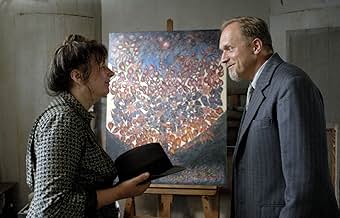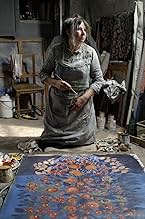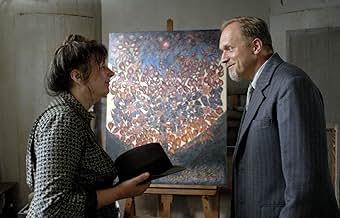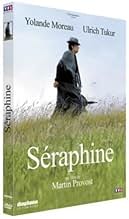Séraphine
- 2008
- Tous publics
- 2h 5m
IMDb RATING
7.4/10
6.7K
YOUR RATING
In 1912 German collector Wilhelm Uhde rents a flat in Senlis to write and take a break from Parisian life. He hires a 48-year old cleaning lady, Séraphine. Some time later, he notices a smal... Read allIn 1912 German collector Wilhelm Uhde rents a flat in Senlis to write and take a break from Parisian life. He hires a 48-year old cleaning lady, Séraphine. Some time later, he notices a small painting on wood at a local notable home.In 1912 German collector Wilhelm Uhde rents a flat in Senlis to write and take a break from Parisian life. He hires a 48-year old cleaning lady, Séraphine. Some time later, he notices a small painting on wood at a local notable home.
- Director
- Writers
- Stars
- Awards
- 20 wins & 10 nominations total
Léna Breban
- Soeur Marguerite
- (as Léna Bréban)
Sandrine Bodenes
- Marie-Louise
- (as Sandrine Bodènés)
Anne Benoît
- Madame Delonge
- (as Anne Benoit)
- Director
- Writers
- All cast & crew
- Production, box office & more at IMDbPro
Featured reviews
A beautifully crafted film about a genius with a gentle soul set in a time of war and recession. The sense of period is brought to life in this heart warming tale of Seraphine de Senlis. Anyone who has ever laid under a large tree as the leaves rustle in the wind or near the waters edge as the sea laps the shore, will appreciate the calm and beauty contained in this wonderful film.
10JustApt
This extraordinary biographical film tells the dramatic story of French paintress Séraphine de Senlis. The tale starts in the summer before the First World War when a known German art collector and critic Wilhelm Uhde accidentally finds out that his servant woman is an amateur artiste painting in naïve but highly innovative and original style. She was doing so because she had a vision of divine being who has told her to begin to paint pictures. Where does genius end and madness begin? Or are they just two sides of the same phenomenon? Questions poised by this artful drama hardly have the answers. To say that Yolande Moreau playing the role of Séraphine Louis is unique is to say the least. Camille Claudel is another brilliant movie in the same vein.
Cinema is a language of deception. The set we see, the mise-en-scene, is what the director wants us to see. Conditioning us visually before an actor even speaks their lines. In costume dramas, the historical clothing is a further weapon to impress a specific artistic vision on us, further cloaking any subtext, whether the transformation of a marriage market story into 'rom-com' (Pride & Prejudice) or consciously travestying the past (Moulin Rouge!, Marie Antoinette). French cinema has achieved respected and less controversial use of costume with films like Jean de Florette and Manon des sources. In these examples, beautiful, nostalgic settings were contrasted with dystopian visions of the hard life. When we move to the biopic, cinematic techniques are routinely used to persuade us of 'what really happened.' Séraphine continues the proud French tradition of costume and historical drama, yet in a very accessible vein. It tells the (true) story of a minor French painter, Séraphine Louis (later known as Séraphine de Senlis, after the village where she lived.) Our story picks up Séraphine working as a maid for Madame Duphot. This lady of the house also rents an apartment to a German art critic-dealer, Wilhelm Uhde. Uhde believes in the 'primitive' artists and takes a liking to some of the maid's work he spots. Yolande Moreau's assured performance gives weight to what may be an unvarnished account. The discovery of the peasant woman's talent, her humble charm as she goes about collecting the ingredients for paint (wine, mud, fruits, flowers) as she goes about her chores as a domestic servant. Everything draws us sympathetically into Séraphine's world.
Udhe nurtures Séraphine's embryonic talent, ensuring it is seen worldwide. But as war hits the economy, support evaporates. Séraphine's inner voices of inspiration lead her to psychosis and she meets her demise in an insane asylum.
The painting itself is of the so-called 'naïve' style, characterized by childlike simplicity. (One of the most famous exponents, according to some, is L. S. Lowry.) The style seems natural to the childlike (if brilliant) personality of our peasant woman, although of course many naive art painters, including Lowry had, unlike Séraphine, plenty of schooling and formal knowledge of art technique.
Production values in the film are high all round. Costume, acting, direction, all achieve a high standard, as evidenced by the many awards heaped on it in its own country. The overall effect is touching without being sentimental.
Séraphine is a continuation of one woman's barely recognised legacy. Any subtext is about serving up a fine character from France's past, a commemoration of national greatness from the early 20th century. (Visits to the exhibition of her work in Senlis have, predictably, quadrupled since the release of the film.) If there is any ideological weakness, it is simply that held by the character herself, a Christian attitude of sacrifice and acceptance of fate. There is no strong judgement on whether Séraphine could have lived her life differently. No real analysis of her painting style. It is, after all, a classy and enchanting fairy tale hung on the hook of a historical person, a harmless deception perhaps. The viewer, should she or he wish, can make their own judgement. Just as they can on the deeply religious and fairly distinctive artworks she left for posterity.
Udhe nurtures Séraphine's embryonic talent, ensuring it is seen worldwide. But as war hits the economy, support evaporates. Séraphine's inner voices of inspiration lead her to psychosis and she meets her demise in an insane asylum.
The painting itself is of the so-called 'naïve' style, characterized by childlike simplicity. (One of the most famous exponents, according to some, is L. S. Lowry.) The style seems natural to the childlike (if brilliant) personality of our peasant woman, although of course many naive art painters, including Lowry had, unlike Séraphine, plenty of schooling and formal knowledge of art technique.
Production values in the film are high all round. Costume, acting, direction, all achieve a high standard, as evidenced by the many awards heaped on it in its own country. The overall effect is touching without being sentimental.
Séraphine is a continuation of one woman's barely recognised legacy. Any subtext is about serving up a fine character from France's past, a commemoration of national greatness from the early 20th century. (Visits to the exhibition of her work in Senlis have, predictably, quadrupled since the release of the film.) If there is any ideological weakness, it is simply that held by the character herself, a Christian attitude of sacrifice and acceptance of fate. There is no strong judgement on whether Séraphine could have lived her life differently. No real analysis of her painting style. It is, after all, a classy and enchanting fairy tale hung on the hook of a historical person, a harmless deception perhaps. The viewer, should she or he wish, can make their own judgement. Just as they can on the deeply religious and fairly distinctive artworks she left for posterity.
A frumpy cleaning woman well into middle age is discovered by an art critic to be a painter with talent comparable to Vincent Van Gogh. Her story is told in the riveting Seraphine, directed by Martin Provost and winner of seven Césars, the French version of the Oscars, including a best actress award for Yolande Moreau. With a screenplay by Martin Provost and Marc Abdelnour, the film is set in the village of Senlis outside of Paris where Séraphine Louis (Yolande Moreau) lives alone and must take odd jobs just to pay for her painting supplies. Séraphine is a visionary, a devout Catholic who believes she is guided by a guardian angel and her exotic paintings of flowers and plants describe her feelings of closeness to spirit.
Treated with disdain by her condescending employer, her life takes on new meaning when a tenant, German art critic Wilhelm Uhde (Ulrich Tukur) hires Séraphine to clean for him and accidentally discovers one of her paintings that her boss had tossed aside. A champion of modern "primitvist" artists who is credited with early recognition of Picasso and Rousseau, Uhde is portrayed by Tukur as a quiet, unassuming man who lives with his sister and a gay lover. He recognizes Séraphine's talent but never shows much enthusiasm, preferring to keep their relationship on a very business-like basis.
Impressed by Seraphine's passionate art, Uhde offers to become her patron but, feeling estranged in France, must soon leave the country to return to Germany as the First World War begins. Although Séraphine continues to paint, she has no connection with Uhde until the latter part of the 1920s when he provides her with the means to quit her job and paint full time. Unfortunately, her grip on reality falters and she is soon hospitalized after indulging in spending sprees on a wedding dress and purchase of a large mansion. One of the saddest scenes in the film is that of Séraphine dressed in a full wedding gown, going door to door giving her away her possessions.
Provost in Séraphine captures the artist's mystical nature and her close bond with nature that shows up in her works, which are still exhibited in many of the world's museums. She is shown hugging trees, climbing them, and standing as a tiny speck beneath a towering shade tree. One scene shows her standing nude in water up to her chest in a nearby river. Provost takes a minimalist approach and the film does not contain much dialogue. The story is told by the silences and facial expressions and the music by Michael Galasso adds richness to the experience. Fully capturing the eternal mystery of the creative process, Séraphine itself is a work of art.
Treated with disdain by her condescending employer, her life takes on new meaning when a tenant, German art critic Wilhelm Uhde (Ulrich Tukur) hires Séraphine to clean for him and accidentally discovers one of her paintings that her boss had tossed aside. A champion of modern "primitvist" artists who is credited with early recognition of Picasso and Rousseau, Uhde is portrayed by Tukur as a quiet, unassuming man who lives with his sister and a gay lover. He recognizes Séraphine's talent but never shows much enthusiasm, preferring to keep their relationship on a very business-like basis.
Impressed by Seraphine's passionate art, Uhde offers to become her patron but, feeling estranged in France, must soon leave the country to return to Germany as the First World War begins. Although Séraphine continues to paint, she has no connection with Uhde until the latter part of the 1920s when he provides her with the means to quit her job and paint full time. Unfortunately, her grip on reality falters and she is soon hospitalized after indulging in spending sprees on a wedding dress and purchase of a large mansion. One of the saddest scenes in the film is that of Séraphine dressed in a full wedding gown, going door to door giving her away her possessions.
Provost in Séraphine captures the artist's mystical nature and her close bond with nature that shows up in her works, which are still exhibited in many of the world's museums. She is shown hugging trees, climbing them, and standing as a tiny speck beneath a towering shade tree. One scene shows her standing nude in water up to her chest in a nearby river. Provost takes a minimalist approach and the film does not contain much dialogue. The story is told by the silences and facial expressions and the music by Michael Galasso adds richness to the experience. Fully capturing the eternal mystery of the creative process, Séraphine itself is a work of art.
Seraphine Louis,who would eventually change her name to Seraphine deSenlis (after the name of her hometown)was an artist who cleaned houses by day,and painted by night (all the time while singing the hymns of her staunch Catholic upbringing,while she was growing up an orphan by Nuns). Seraphine is pretty much maligned by the village locals,taunted by children,and pretty much avoided by most all that know her. When German art collector & critic,Wilhelm Uhde rents a room in the town of Senlis,while on the run from the insanity of World War I,and discovers a painting by Seraphine & is amazed by it's use of colour & texture. When the war moves ever closer,Uhde & his sister escapes the madness. Years later,he returns to Senlis,rediscovers an aged,but still painting Seraphine & vows to put her work on display (despite the fallout of the Wall Street crash of 1929,as well as the subsequent great depression,that managed to cripple a good percentage of Europe's economy,as well). Martin Provost directs & co writes (with Marc Abdelnoir)a lovingly depicted portrait of a woman possessed of genius that is cruelly stolen too early (deSenlis spent her aged years in an insane asylum & never painted again in life). Yolande Moreau plays Seraphine,a woman unpossesed by pretentious,real fine. Ulrich Tukur plays Wilhelm Uhde,in a winning role that depicts Uhde as an impresario of art first,and who's personal life is down played,somewhat (in life,Uhde was an ardent homosexual that made no bones about his gay lifestyle). The photography is a real treat for the eye (at times,the composition of visual images are very painterly,such as films such as 'Tous Le Matin Du Monde'). A film to check out for those with a love of art,or art history (or both). Spoken in French & German with English subtitles. Not rated by the MPAA,this film contains flashes of nudity & adult content.
Did you know
- TriviaSince the film's release, the number of visitors at the museum of Senlis exhibiting Séraphine's works has quadrupled (August 2009).
- GoofsThe film opens in 1914 showing the arrival of Wilhelm and Anne-Marie at the village. Wilhelm actually arrived in 1912, two years before the start of the war.
- Crazy creditsThe credits list the names of the paintings which are seen in the film - 10 paintings by Séraphine and the artworks owned by Uhde and Kolle.
- SoundtracksConsonent laudes!
Written by Louis Rousseau
Performed by Yolande Moreau, Françoise Lebrun and Léna Breban
- How long is Seraphine?Powered by Alexa
Details
- Release date
- Countries of origin
- Official sites
- Languages
- Also known as
- Seraphine
- Filming locations
- Production companies
- See more company credits at IMDbPro
Box office
- Budget
- €3,674,000 (estimated)
- Gross US & Canada
- $884,613
- Opening weekend US & Canada
- $38,637
- Jun 7, 2009
- Gross worldwide
- $9,402,702
- Runtime2 hours 5 minutes
- Color
- Sound mix
- Aspect ratio
- 1.85 : 1
Contribute to this page
Suggest an edit or add missing content



































